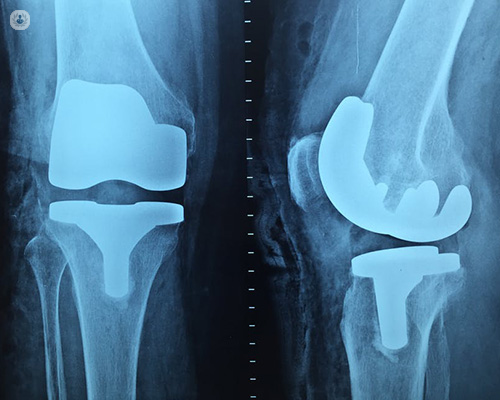Here, distinguished consultant orthopaedic surgeon, Mr Loren Charles, details how a total knee replacement operation is typically performed, and what outcomes patients can expect after the surgery.

What is a total knee replacement?
Total knee replacement (TKR), also known as knee arthroplasty, is a surgical procedure aimed at alleviating pain and restoring function in severely diseased knee joints. This operation is typically recommended for patients suffering from chronic knee pain and disability due to conditions like osteoarthritis, rheumatoid arthritis, or traumatic injury.
What happens during the procedure?
During a total knee replacement, an orthopedic surgeon removes the damaged cartilage and bone from the surface of the knee joint. These are then replaced with artificial components made of metal and plastic, designed to mimic the natural movement of a healthy knee. The procedure involves resurfacing the ends of the femur (thigh bone) and tibia (shin bone) as well as the underside of the patella (kneecap), if necessary.
What patients are considered for total knee replacement?
Patients considered for TKR usually experience significant knee pain and swelling, stiffness, and decreased knee mobility that cannot be managed effectively with conservative treatments such as medications, physical therapy, or lifestyle modifications. The decision to undergo knee replacement surgery is often made when these symptoms severely impact the quality of life, including the ability to perform daily activities.
How long does a total knee replacement operation last?
The surgery itself typically takes about one to two hours and is followed by a hospital stay of several days. Postoperative care includes pain management, physical therapy, and gradual return to activities. Most patients can resume normal daily activities within six weeks, although full recovery and optimal function may take up to a year.
What are the expected outcomes?
Outcomes for TKR are generally positive, with the majority of patients experiencing significant pain relief, improved mobility, and better quality of life. Advances in surgical techniques and implant materials have enhanced the durability of knee replacements, with many lasting 15 to 20 years or more.
What are the associated risks?
Despite its benefits, TKR is not without risks, which can include infection, blood clots, and implant issues. However, careful patient selection, surgical expertise, and adherence to postoperative care protocols can minimize these risks, making total knee replacement a highly effective solution for chronic knee pain and dysfunction.



